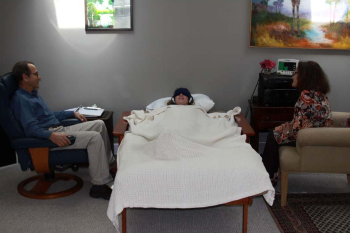
MDMA-Assisted Psychotherapy a Promising Treatment for PTSD
In recent years, MDMA-assisted Psychotherapy has been highlighted as a breakthrough therapy in the treatment of post-traumatic stress disorder (PTSD) and other mental health disorders. The properties of MDMA that make it helpful in therapy include boosting empathy and compassion, as well as increasing feelings of interpersonal closeness and tolerance of distressing memories.
The Multidisciplinary Association for Psychedelic Studies (MAPS) is a non-profit research and educational organization focused on the medical benefits of psychedelics and marijuana, including MDMA-assisted psychotherapy. Their main project is a $26.9 million-dollar plan to make MDMA an approved prescription medicine under the U.S. Food and Drug Administration (FDA) by 2021.
Currently MDMA is only approved for use in research, and there is no approval for use in therapy. The expanded access of the use of MDMA under a treatment protocol will address conditions for patients who do not currently have promising treatment options or for whom conventional psychotherapy or pharmacological treatments have been ineffective. A recent trial with individuals with chronic PTSD who failed to respond to other treatments, found that after just two to three sessions of psychotherapy with active doses of MDMA, symptoms were markedly reduced. Twelve months later, most participants no longer met criteria for PTSD.

The Remedy clinic in Toronto, which has co-facilitated research with MAPS, is actively researching the use of MDMA-assisted cognitive processing therapy for couples where one or both partners have been diagnosed with PTSD. Both clients, regardless of diagnosis, are treated with one 80mg dose of MDMA in the morning and can choose to receive an additional supplemental half dose an hour and a half into the session. During the session, clients are seated in a reclining chair or futon and spend the day “going inside,” or entering a reflective internal state from which they talk to the therapist and to each other. After staying overnight, clients meet with the therapist for an integration session, or a conversation about the therapy.
In an interview with the Trauma and Mental Health Report, Anne Wagner, a psychologist and founder of Remedy, discussed the benefits of using MDMA within the therapy session:
“We see MDMA as being an adjunct to the therapy process that can potentially enhance the effects of the therapy. What MDMA allows the couple to do is create a deep and meaningful bonding experience which allows them to process their feelings about symptoms together… The MDMA experience varied between people but what we have noticed is that people are able to stay with their emotions and not run away with them; trying to avoid emotions is a hallmark of PTSD. Staying with whatever comes up and going into the traumatic memory without wanting to turn away from it is very important because running away from trauma is what keeps people stuck.”
Wagner describes the role of the therapist during a session:
“We are there to help them go through this experience. As therapists, we try to coordinate the interactions between the partners. If one is having an experience, we wait until they are at a point where they are able to receive the other persons insights or experience by taking notes and relaying them back to the partner.”

There is also the potential for MDMA-assisted psychotherapy to be helpful even with clients who do not have symptoms of PTSD. Wagner explains:
“The couples work is very important because we are not only treating clients with PTSD, but we’re also treating the functioning of the relationship. I’m hopeful that this technique will be used for people who don’t have a PTSD diagnosis, but who are struggling with issues in their life outside of a clinical diagnosis. It’s looking at the experience and looking at all the context that was there, and not the story we have woven about it. It’s more about being able to see it with more nuance and complexity that’s really important, and that’s what ultimately helps with acceptance.”
There are some limitations on the use of MDMA in therapy; individuals who are on SSRIs are not treated with MDMA. And according to Wagner, clients should be in good physical health, and any existing conditions should be closely monitored. Substance use disorders, such as alcoholism, or any other drug usage which could result in withdrawal symptoms, psychosis, or mania may disqualify clients as well.
-Eleni Neofytou, Contributing Writer
Feature: Activedia at Pixabay, Creative Commons
First: Courtesy of The Multidisciplinary Association for Psychedelic Studies (MAPS)
Second: Jenna Hamra at Pexels, Creative Commons




Hi,
My name is Hannah and I am very interested in the work that is being done to help people move past their traumas and PTSD. I’ve long been researching the effects of the use of MDMA in therapeutic settings and I believe it is truly a viable option for persons struggling with those issues.
I’m writing to you on behalf of my fiance who has had nothing short of a terrible life on top of being deployed to Afghanistan. Her life is filled with childhood trauma from constant familial abuse, PTSD from passing helicopters and feeling like someone is out to get her. If she didn’t have me supporting her, I truly believe she would have taken her own life by now as I still have to regularly talk her out of suicidal ideations and talk of self hatred.
She speaks with a therapist on a regular basis and she claims that she has shared more with me than anyone else, but when asked to share any emotions, asked how she feels or anything related to her past (by both myself and her therapist) she physically cannot. The walls she puts up are impenetrable and I don’t believe they will ever come down voluntarily.
I believe that my Fiance Yudith would be a perfect candidate for these trials and that it may be one of the only ways to help her. I am willing to try anything to help her achieve happiness.
Thank you so much for listening. Please let me know if you can help us.
Hannah